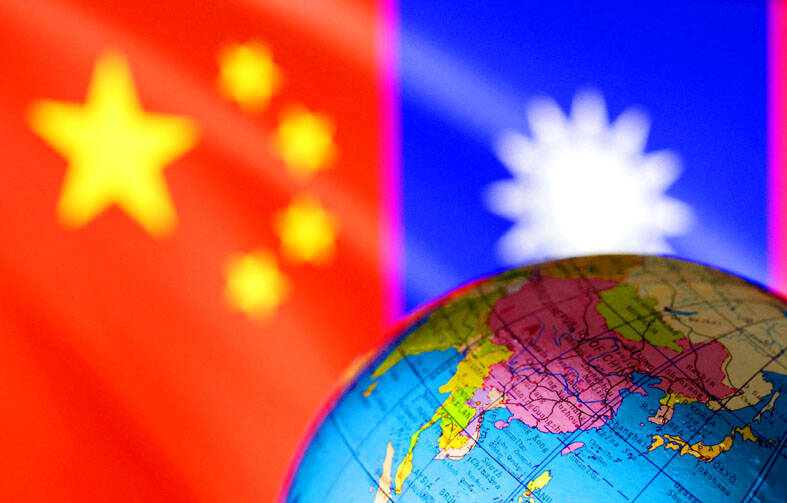President William Lai’s (賴清德) stopovers in Hawaii and Guam during his first overseas trip to Taiwan’s Pacific diplomatic allies are indicative of a Taiwan-US alliance to counter China’s Belt and Road Initiative (BRI), a Taipei-based security expert said on Sunday.
Lai arrived in Hawaii on Saturday for a two-day stopover on his trip to Palau, Marshall Islands and Tuvalu, and is scheduled to make a stopover in Guam on his return trip.
Lai’s trip is set to “link” the first, the second and third island chains, said Su Tzu-yun (蘇紫雲), a research fellow at the government-funded Institute for National Defense and Security Research.

Photo: Reuters
Taiwan is on the first island chain, while Guam and Palau are along the second island chain, and Hawaii is on the third island chain, Su said.
The three island chains are strategically important for curbing China’s expansionism and, in particular, the BRI, he said.
The first island chain is the “first line of defense” against Chinese expansionism and a critical maritime route for fuel, with Taiwan at the center of this chain, Su said.
As China is building deep-water harbors in the Solomon Islands and Peru and a space tracking station in Kiribati, fortifying the second island chain aids efforts to defend the first island chain is in the interest of the US and its allies, he said.
Meanwhile, open-source data showed that the George Washington Carrier Strike Group (CSG) is deployed in Yokosuka, Japan, while the Abraham Lincoln CSG is in Port Klang, Malaysia, and the USS Carl Vinson supercarrier is in the East Pacific.
Asked if such deployments were made to deter China from overreacting to Lai’s passing through the US state and territory, Association of Strategic Foresight research fellow Chieh Chung (揭仲) said they were aimed to deter China, but were unlikely related to Lai’s itinerary.
Academics have said that there is a high possibility Lai’s transit stops in the US could trigger Beijing, causing it to hold large-scale military exercises near Taiwan, in part to “set the ground rules” for US president-elect Donald Trump regarding Taiwan.
However, this is unlikely as such a tactic could irritate Trump and have the opposite effect, the academic added.
Rather, the move is likely intended to warn China not to engage in any unnecessary or provocative behavior in the Taiwan Strait in the run-up to Jan. 20, when Trump is to be inaugurated, he added.
The first island chain refers to the archipelago consisting of the Aleutian Islands, the Japanese archipelago, South Korea, the Ryukyu Islands, Taiwan, the Philippines and the Greater Sunda Islands.
The second island chain refers to the Izu Islands, the Bonin Islands, the Mariana Islands, the Caroline Islands, Guam, Palau and Halmahera Island.
The third island chain refers to Alaska, Hawaii, US- governed Pacific Islands, Australia and New Zealand.

Taiwan has received more than US$70 million in royalties as of the end of last year from developing the F-16V jet as countries worldwide purchase or upgrade to this popular model, government and military officials said on Saturday. Taiwan funded the development of the F-16V jet and ended up the sole investor as other countries withdrew from the program. Now the F-16V is increasingly popular and countries must pay Taiwan a percentage in royalties when they purchase new F-16V aircraft or upgrade older F-16 models. The next five years are expected to be the peak for these royalties, with Taiwan potentially earning

STAY IN YOUR LANE: As the US and Israel attack Iran, the ministry has warned China not to overstep by including Taiwanese citizens in its evacuation orders The Ministry of Foreign Affairs (MOFA) yesterday rebuked a statement by China’s embassy in Israel that it would evacuate Taiwanese holders of Chinese travel documents from Israel amid the latter’s escalating conflict with Iran. Tensions have risen across the Middle East in the wake of US and Israeli airstrikes on Iran beginning Saturday. China subsequently issued an evacuation notice for its citizens. In a news release, the Chinese embassy in Israel said holders of “Taiwan compatriot permits (台胞證)” issued to Taiwanese nationals by Chinese authorities for travel to China — could register for evacuation to Egypt. In Taipei, the ministry yesterday said Taiwan

‘LIKE-MINDED PARTNER’: Tako van Popta said it would be inappropriate to delay signing the deal with Taiwan because of China, adding he would promote the issue Canadian senators have stressed Taiwan’s importance for international trade and expressed enthusiasm for ensuring the Taiwan-Canada trade cooperation framework agreement is implemented this year. Representative to Canada Harry Tseng (曾厚仁) in an interview with the Central News Agency (CNA) said he was increasingly uneasy about Ottawa’s delays in signing the agreement, especially as Ottawa has warmed toward Beijing. There are “no negotiations left. Not only [is it] initialed, we have three versions of the text ready: English, French and Mandarin,” Tseng said. “That tells you how close we are to the final signature.” Tseng said that he hoped Canadian Prime Minister Mark Carney

POSITIVE DEVELOPMENT: Japan and the US are expected to hold in-depth discussions on Taiwan-related issues during the meeting next month, Japanese sources said The holding of a Japan-US leaders’ meeting ahead of US President Donald Trump’s visit to China is positive news for Taiwan, former Japan-Taiwan Exchange Association representative Hiroyasu Izumi said yesterday. After the Liberal Democratic Party’s landslide victory in Japan’s House of Representatives election, Japanese Prime Minister Sanae Takaichi is scheduled to visit the US next month, where she is to meet with Trump ahead of the US president’s planned visit to China from March 31 to April 2 for a meeting with Chinese President Xi Jinping (習近平). Japan and the US are expected to hold in-depth discussions on Taiwan-related issues during the